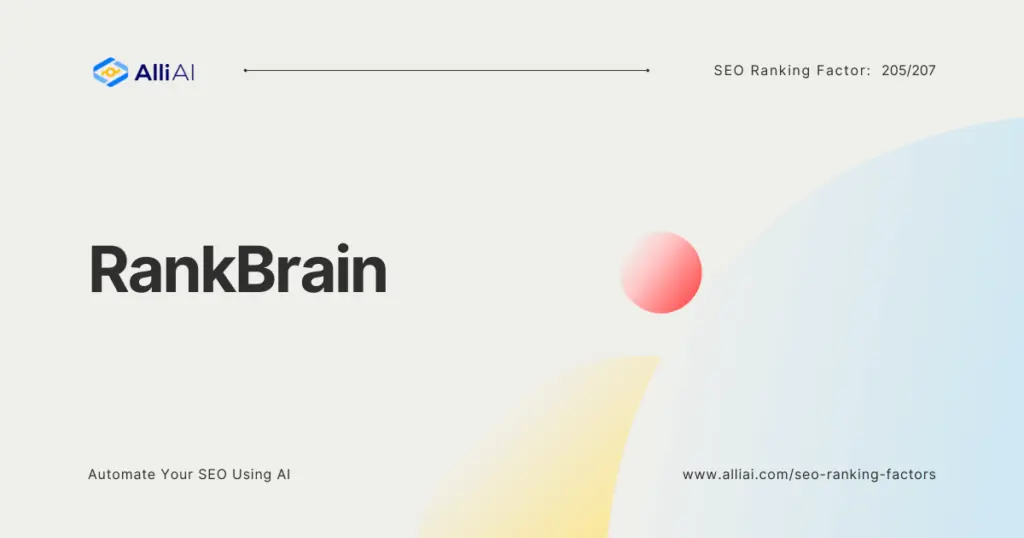What is RankBrain?
RankBrain is a component of Google’s core algorithm which uses machine learning (the ability of machines to teach themselves from data inputs) to determine the most relevant results to search engine queries. Pre-RankBrain, Google utilized a basic algorithm to determine rankings. However, with RankBrain, Google can interpret the nuances of language in a more human-like way, understanding the context and the intention behind searches.
Imagine you’re trying to interpret a complex piece of modern art. Everyone sees it a little differently because they’re bringing their own interpretations and experiences to it. RankBrain does something similar with search queries. It looks at the words and phrases people use and tries to figure out the intent behind them, even if it hasn’t come across those exact words or phrases before. It’s like having a savvy friend who can guess what you’re trying to say, even when you don’t express it perfectly.
Historical Evolution of Google’s Algorithms
RankBrain, introduced in 2015, is a component of Google’s core algorithm that leverages machine learning to decipher the nuances of human language and search behavior. Unlike traditional algorithms that relied on pre-defined rules, RankBrain learns and adapts continuously, improving its ability to understand the intent behind search queries.
At its core, RankBrain employs a combination of advanced machine learning techniques:
- Word Vectors (Word2Vec): This model represents words as numerical vectors in a multi-dimensional space. Words with similar meanings are closer together, allowing RankBrain to understand semantic relationships between terms.
- Neural Networks: These complex networks of interconnected nodes mimic the human brain’s ability to learn and recognize patterns. RankBrain uses neural networks to analyze vast amounts of search data and identify correlations between queries, user behavior, and content relevance.
Through these techniques, RankBrain goes beyond simple keyword matching. It interprets the context of a query, considers user location and search history, and analyzes how users interact with search results to refine its understanding of what users truly want.
How RankBrain affects SEO?
RankBrain’s integration into Google’s algorithm has profound implications for SEO:
- Understanding User Intent: RankBrain’s ability to interpret the nuances of language means that SEOs must shift their focus from optimizing for specific keywords to understanding and catering to user intent. This involves creating comprehensive content that addresses a variety of questions and needs related to a specific topic.
- User Experience (UX): RankBrain considers user signals like click-through rate (CTR), dwell time, and bounce rate as indicators of content relevance and quality. Optimizing for a positive user experience, including fast page load times, clear navigation, and engaging content, becomes increasingly important.
- Long-Tail Keywords: RankBrain excels at understanding longer, more conversational queries. This opens up opportunities for SEOs to target long-tail keywords that reflect the natural language people use when searching.
- Featured Snippets: RankBrain plays a role in determining which content is displayed in featured snippets, the informative boxes that appear at the top of search results. Optimizing content for featured snippets can significantly boost visibility and traffic.
Real-World Examples
The impact of RankBrain is evident in numerous search results. For example, a search for “best running shoes” might not just return pages that include those exact words. RankBrain might also consider factors like the user’s location, past search history, and the current trends in running shoes to provide more personalized and relevant results.
Another example is the way RankBrain handles ambiguous queries. If a user searches for “apple,” RankBrain will analyze the context of the search (e.g., the user’s location, recent searches) to determine whether they are looking for information about the fruit, the technology company, or something else entirely.
Future of RankBrain and SEO
As AI technology advances, we can anticipate that RankBrain will become even more sophisticated, possibly offering even more personalized search results based on a deeper understanding of individual user preferences and behaviors. For SEO, this means a shift towards more natural language content, deeper contextual targeting, and an increased emphasis on user engagement as ranking factors.
FAQ
How does RankBrain differ from other SEO factors?
RankBrain distinguishes itself from other SEO factors by utilizing machine learning to interpret the nuances of human language. Unlike static algorithms that rely on fixed rules, RankBrain continuously learns and evolves based on new data, making it uniquely adept at understanding the intent behind search queries and ranking content accordingly.
Can SEOs optimize directly for RankBrain?
Direct optimization for RankBrain isn’t possible in the same way you’d optimize for keywords or backlinks. Since RankBrain focuses on interpreting user intent, the best strategy is to ensure your content is comprehensive, relevant, and genuinely useful to your audience. Focus on creating a great user experience and delivering content that satisfies the searcher’s query.
How do I know if my SEO is affected by RankBrain?
Monitoring changes in your website’s traffic and rankings, especially after updates to Google’s algorithm, can provide insights into whether RankBrain has impacted your site. A sudden change in how your pages perform for specific queries could indicate that RankBrain has reassessed the relevance of your content to those queries.
Conclusion
RankBrain represents a shift towards more intuitive and human-like search processes, emphasizing the importance of content quality and relevance in SEO. As it continues to evolve, understanding and adapting to RankBrain’s nuances will be crucial for SEO success. Focusing on user intent, enhancing the user experience, and creating valuable content are key strategies to thrive in a RankBrain-influenced landscape. SEOs cannot optimize for RankBrain in the traditional sense but improving these aspects will invariably align with RankBrain’s goal of delivering the most relevant, high-quality search results to users.






